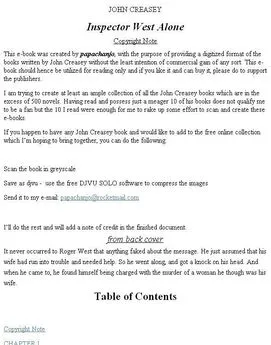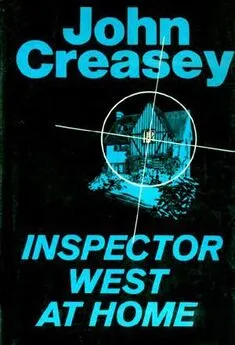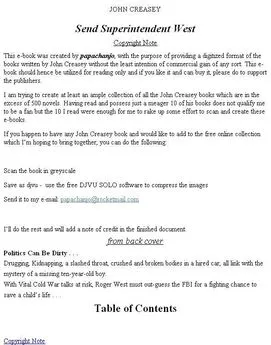John Creasey - Inspector West Alone
- Название:Inspector West Alone
- Автор:
- Жанр:
- Издательство:неизвестно
- Год:неизвестен
- ISBN:нет данных
- Рейтинг:
- Избранное:Добавить в избранное
-
Отзывы:
-
Ваша оценка:
John Creasey - Inspector West Alone краткое содержание
Inspector West Alone - читать онлайн бесплатно полную версию (весь текст целиком)
Интервал:
Закладка:
“Who did you expect to find?”
“Not—not you.”
“I’ve believed you, so far. Who did you want to kill?”
“Rayner,” said the ginger-haired man.
So he had inherited an enemy as well as a name.
“Why?”
“He killed my wife.”
“Murderers get hanged.”
“It wasn’t known as murder,” the ginger-haired man said wearily. “It just wasn’t discovered, but I knew. I was inside when it happened. He always told me he’d kill her if she wouldn’t do what he wanted. She didn’t, and he killed her.”
Was this another of Kennedy’s little tricks?
“I’m—Kyle,” the man muttered.
“Why did they put you inside?” Kyle, Kyle? The name was familiar, and rang a bell in his memory.
“Forgery,” Kyle said simply. “I’m an engraver. I’m a good engraver.” That incongruous hint of dignity came again. “My products were practically undetectable.”
That was true: yes, Kyle. He’d been caught and tried in Manchester. It was one of those cases in which a provincial force had stolen a march on the Yard. Eddie Day, purveyor of faked messages, had gone to Manchester to hold a watching brief for the Yard, and had come back shaken by the cleverness of the forgeries.
“When did you come out?”
“A month ago.”
“What have you been doing since?”
“Looking for Rayner.”
“Are you still on your ticket?”
“Yes, I report twice a week. I go to Bow Street while I’m in London.”
“What does this man, who calls himself Rayner, look like?”
The watery pale-blue eyes, with their pink lids and thin fair lashes, looked puzzled.
“Don’t you know?”
“I am Rayner.”
“No, no! You can’t be! You——”
“The other man used my name. What’s he like? What’s his most noticeable feature?”
Kyle said softly and in a voice which seemed to be filled with hatred:
“You would never forget Rayner. His eyes—how I hated his eyes. Denise did, too, although they fascinated her, she—she was attracted to him, but he frightened her. He wanted her to go with him and leave me. My pals told me that Rayner told her he would kill her if she didn’t go to him. She didn’t go. She was killed in—in an accident. Accident!” Shrillness put an edge to his voice, and his eyes blazed. “She was run down by a car, all her beauty spoiled. All her beauty.” He took a photograph from his pocket, and his fingers trembled. He stared down at it, and tears glistened in his eyes. He whispered: “Look!”
She was gay and smiling, a queen to this man’s slave. It was easy to believe that Kyle had worshipped her.
Roger said: “I can understand why you don’t like Rayner. Let me have a look at your wallet.”
“I—no!”
“Come on.”
Kyle handed it over, reluctantly. Roger shook the contents of the wallet on to the brown-leather surface of the desk. He saw the expected oddments: a ticket of leave, prison-discharge form, registration card—an old, tattered, dog-eared letter dated eight years ago, a ten-shilling note, and another photograph. He turned the photograph over. He knew that Kyle was watching him, jealously intent, and kept his face set.
It wasn’t easy, for this was the girl from Paris—Lucille.
He stared down at it, then at the picture of Kyle’s dead wife.
These were alike, with unmistakable family likeness.
* * * *
“You pick good lookers,” Roger growled, after a long pause.
“Please!” Kyle’s dignity rose again. “That is my daughter.”
“Sure?”
“I am quite sure,” said Kyle. “That is Lucille.” He gave a gentle smile. “Years ago, I sent her to France, to my wife’s family. I met Denise during the first Great War. Lucille was so good and clever, and I did not want her smeared with my reputation. My wife and I agreed it was best. We had anxious days during the last war, my wife suffered most, because I wasn’t there to help her bear her loneliness, but all was well, Lucille was in a country-district, no harm befell her.” The pedantic phrases had a touch of dreaminess.
“Lucky Lucille,” Roger’s voice seemed to stick in his throat. “Where does she live now?”
“In Paris.”
“What’s her address?”
“That I shall not tell you.”
“Let me have that address. Kyle. You’ll regret it if you don’t. Afterwards, you can clear out of here. I’ll stake you for a few weeks.” Roger took out his wallet, and counted ten one-pound notes; Kennedy had given him fifty.
Eagerness but not avarice gleamed in Kyle’s eyes.
“I’ll stake you for ten a month,” Roger said. “I’ll send them to your address.”
“No! No, that wouldn’t be safe, I’m at Joe’s.” Joe’s was a verminous den, a doss-house that remained a blot on London, as it had been in the dark, squalid London back streets of Victorian days. “Send it to—but why are you going to stake me?”
“I don’t like men who use my name. You’ll keep quiet. If anyone asks, you came here to beg, and I kicked you out.”
“Yes, yes!”
“Where’s Lucille?” In a lonely pauper’s grave, somewhere in Surrey, a nameless corpse.
“She is at 23 Rue de Croix, Paris 8.” The information came out slowly and reluctantly; but it came. “You won’t harm her?”
“No. I’ll post ten bars a month to you in the name of John Pearson at the Strand Post Office—Trafalgar Square end. Now clear out. If anyone worries you, telephone me here.” Using block capitals, he wrote the number, taken from the telephone, on a strip of paper, printed the name of John Pearson, c/o the Strand G.P.O., as a reminder, and pushed it across the desk. “Don’t write, don’t come again unless I send for you. Is that understood?”
“Yes, but—I don’t understand.”
“You don’t have to.” Roger stood up. “Pull your hat over your eyes when you go out, don’t let anyone get a good look at you. You might be in trouble if your friend knows you’ve been after him.”
Kyle nodded. For years, in prison, he had done what he was told, the habit of obedience was strong in him.
Roger went into the outer office with him, watched him pick up his cap and go out, small, spindly, nervous. Roger followed him down the creaky narrow stairs, a few steps behind him.
Ginger Kyle slipped away towards the market.
Another man came along the street, walking briskly.
Detective Inspector Sloan of the Yard, tall, blond, with an alert, eager face, good blue eyes and powerful body and shoulders, watched Kyle keenly.
Roger, his heart hammering, went upstairs. At the second-floor landing, he paused.
Sloan was coming in from the street.
CHAPTER XII
TEST
ROGER opened the dictaphone panel, switched the machine on, then sat at his desk. He opened a drawer, took out some papers—the first that came to hand—and spread them out. Sloan’s footsteps sounded on the landing. Roger heard the outer door open.
Kennedy was a fool not to have primed him. But was he? This had all the signs of a trap; the empty office, and Sloan’s visit. Would Kennedy have let him stay here alone without a purpose?
No.
Sloan’s footsteps were firm, not heavy: Roger knew them well, they had worked on a hundred cases together.
Sloan tapped.
Roger wiped his forehead, and called: “Come in.”
Sloan thrust the door open firmly and took a good look round the office before coming in and closing the door. He looked hard at Roger, as at a man he was seeing for the first time. To Roger, it was a moment of screaming tension, but—Sloan did not recognize him.
Roger said: “Well?”
“Mr. Rayner? Charles Rayner?”
“Yes.”
“Sorry to worry you, Mr. Rayner.” That was perfunctory, Roger couldn’t mistake Sloan’s hostility, as he pulled up a chair and sat down. He took out his cigarettes, in a familiar yellow packet.
“Smoke?”
“No. Who are you?”
Sloan lit up and took out a card and held it forward. Roger glanced at it.
“You may be a policeman, but you don’t own the world.”
“I just help to keep it clean,” said Sloan. “You had a visitor just now. A certain Mr. Kyle, who spent a lot of time behind bars.”
“So he told me.” The dictaphone picked that up, so Kennedy would learn about Kyle’s visit.
“What did he want?”
“Work.”
“Did you give him any?”
“No.”
“Why did you see him off?”
“To make sure he left the premises.”
“So you’ve got all the answers, Mr. Rayner.”
“That’s right.”
“I hope you’ve some more answers up your sleeve, Mr. Rayner.” Sloan was heavily sarcastic. “This is an informal call. Can I take it that you’d swear in court that you’d never seen Kyle before?”
“Yes.”
“What business do you transact, Mr. Rayner?”
“I’m a commission agent.”
“That covers a lot of—things.” The pause made the words an accusation. “How long have you been in business here?”
“I haven’t.”
That startled Sloan. “This is your office.”
“I open here next week.”
“Did you have another office, before this, or have you just started in business, Mr. Rayner?”
“You’ve a lot of men to help you find out things like that.”
“A peculiar attitude to adopt, Mr. Rayner.”
“If there’s anything peculiar here, it’s your manner.”
“I see.” Sloan read the obvious into that—the obvious that wasn’t true, and which made Kennedy’s failure to give a briefing almost a tragedy. “So you don’t intend to help the police, Mr. Rayner.”
“When I know how I can help, I will.”
“Is this a new business?”
“How will the answer help you?”
Sloan said: “People who are awkward with the police often regret it. Don’t forget that.”
“Policemen who come on their own aren’t entitled to all the answers.”
“So you’re clever, too. Where do you live?”
“This is my address.”
“Morning, noon, and night?”
Roger said slowly, heavily: “Inspector, I don’t like your manner. I don’t know the man who came here just now. Don’t blame me if he’s a crook. I’m not. Next time you want information, don’t start by accusing me of being a liar. Now I’ve work to do.”
“Who for?” asked Sloan. “Kennedy?”
* * * *
It was like looking at the world from the moon; he knew what lay behind every word, was familiar with every inflection of Sloan’s voice. He’d had a split second of warning that a bombshell was coming. He hadn’t known what, and the “Kennedy” came out with shattering effect, but he kept a poker face.
“Who’s Kennedy?” he asked, blankly.
“So you don’t know?”
“No.”
“You’re making a mistake, Mr. Rayner.”
“Try making one yourself,” Roger said.
“You insist that you don’t know Kennedy?”
“Tell me which Kennedy and why you want to know, and I’ll tell you—if I like your reasons.”
It was fascinating to sit and watch, to guess—to know— the thought passing through Sloan’s mind. They stared each other out, and then Sloan’s eyes went dull, which meant he was going all the way.
“You are Kennedy,” he said. “Let’s have the truth.”
He was Roger West, alias Charles Rayner.
Kyle knew Kennedy as Rayner.
Sloan had guessed that Kennedy and Rayner were one and the same person; and Sloan wouldn’t make a wild guess, he had reason for thinking that.
* * * *
“You can’t keep facts from the police for long,” Sloan said, but he knew that his challenge had failed.
Читать дальшеИнтервал:
Закладка:










